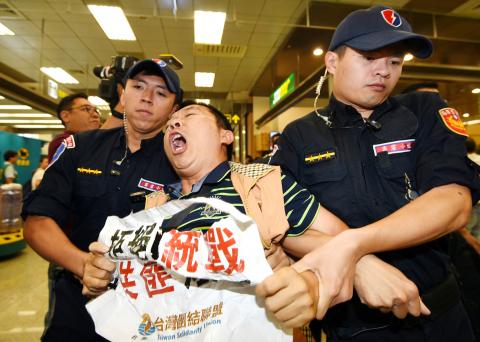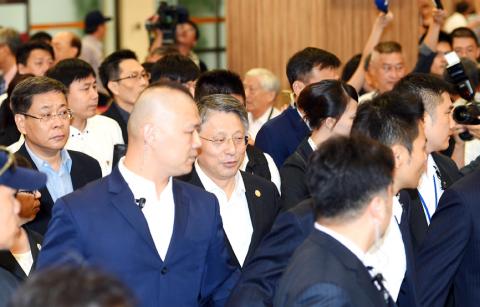Members of the Taiwan Solidarity Union (TSU) yesterday met Chinese delegates to the Taipei-Shanghai City Forum with a noisy protest at Taipei International Airport (Songshan airport), with members jostling police and shouting slogans.
About 30 TSU members, outnumbered and surrounded by police officers, shouted: “Reject unification. Communist bandits get out,” as the delegation, led by Shanghai Municipal Committee United Front Work Department Director Sha Hailin (沙海林), walked out of the heavily guarded airport shortly before noon.
Police restrained enraged TSU members when a group of demonstrators in support of Sha’s arrival raised a banner printed with greetings, while a TSU member who broke a police cordon and entered the airport concourse to protest the delegation was immediately arrested.

Photo: Chang Chia-ming, Taipei Times
A group of Atayal Aborigines from Hsinchu County gathered at the airport to welcome Sha, singing songs and shouting: “Leader Sha, we love you.”
Escorted by police and bodyguards, Sha waved to his supporters then left the airport immediately.
Former TSU legislator Chou Ni-an (周倪安) said it was unimaginable that Taipei Mayor Ko Wen-je (柯文哲) would welcome a top United Front official with open arms.

Photo: Chang Chia-ming, Taipei Times
Instead of holding talks with his Shanghai counterpart, Ko was for some reason willing to meet Sha, whose attendance in his capacity as a United Front official was inappropriate for the mayoral forum, Chou said.
A military official should replace Ko to participate in the forum instead, Chou added.
“We hope Ko does not become a participant in China’s United Front operations. President Tsai Ing-wen (蔡英文) has refused to accept the so-called ‘1992 consensus.’ Does Ko plan to step over the line and offer an opportunity for China to assert the ‘1992 consensus’?” she said.
The “1992 consensus” refers to a supposed understanding between the Chinese Nationalist Party (KMT) and the Chinese government that both sides of the Strait acknowledge there is “one China,” with each side having its own interpretation of what “China” means.
“Only an evil country that intends to annex other countries would establish a United Front Work Department, but Ko welcomes the Chinese Communist Party with open arms. The TSU issues a formal protest,” Chou said.
“Ko saying that the nation has stigmatized the United Front operation is as indiscreet as his inviting a United Front figure to Taiwan,” TSU official Tsai Feng-wen (蔡豐文) said, referring to comments by Ko earlier this month that the United Front is a stigmatized term in Taiwan, but is a neutral word in China.
TSU Department of Organization deputy director Chang Chao-lin (張兆林) said Ko is trying to play a broker’s role amid slowed cross-strait interactions, in a bid to accumulate political capital.
“Such an act is intended to curry favor with pan-blue voters, but it will estrange Ko from the naturally independent younger generation,” Chang said.
TSU Youth Department deputy director Hsu Ya-chi (許亞齊) said the party does not plan to boycott international or intercity interactions, but it is compelled to prevent China’s attempted annexation of Taiwan under the banner of intercity exchange.
The TSU yesterday evening staged a protest outside Taipei City Hall, where a banquet was held in honor of the Chinese delegation.
Hsu said the TSU would shadow Sha’s stay in Taiwan with protests.
Separately yesterday, Ko hailed the forum between Taipei and Shanghai as an opportunity to break a stalemate in official cross-strait exchanges.
The forum would serve as an opportunity for the two sides to engage in friendly exchanges, Ko added.
Additional reporting by CNA

CHAOS: Iranians took to the streets playing celebratory music after reports of Khamenei’s death on Saturday, while mourners also gathered in Tehran yesterday Iranian Supreme Leader Ayatollah Ali Khamenei was killed in a major attack on Iran launched by Israel and the US, throwing the future of the Islamic republic into doubt and raising the risk of regional instability. Iranian state television and the state-run IRNA news agency announced the 86-year-old’s death early yesterday. US President Donald Trump said it gave Iranians their “greatest chance” to “take back” their country. The announcements came after a joint US and Israeli aerial bombardment that targeted Iranian military and governmental sites. Trump said the “heavy and pinpoint bombing” would continue through the week or as long

TRUST: The KMT said it respected the US’ timing and considerations, and hoped it would continue to honor its commitments to helping Taiwan bolster its defenses and deterrence US President Donald Trump is delaying a multibillion-dollar arms sale to Taiwan to ensure his visit to Beijing is successful, a New York Times report said. The weapons sales package has stalled in the US Department of State, the report said, citing US officials it did not identify. The White House has told agencies not to push forward ahead of Trump’s meeting with Chinese President Xi Jinping (習近平), it said. The two last month held a phone call to discuss trade and geopolitical flashpoints ahead of the summit. Xi raised the Taiwan issue and urged the US to handle arms sales to

State-run CPC Corp, Taiwan (CPC, 台灣中油) yesterday said that it had confirmed on Saturday night with its liquefied natural gas (LNG) and crude oil suppliers that shipments are proceeding as scheduled and that domestic supplies remain unaffected. The CPC yesterday announced the gasoline and diesel prices will rise by NT$0.2 and NT$0.4 per liter, respectively, starting Monday, citing Middle East tensions and blizzards in the eastern United States. CPC also iterated it has been reducing the proportion of crude oil imports from the Middle East and diversifying its supply sources in the past few years in response to geopolitical risks, expanding

Pro-democracy media tycoon Jimmy Lai’s (黎智英) fraud conviction and prison sentence were yesterday overturned by a Hong Kong court, in a surprise legal decision that comes soon after Lai was jailed for 20 years on a separate national security charge. Judges Jeremy Poon (潘兆初), Anthea Pang (彭寶琴) and Derek Pang (彭偉昌) said in the judgement that they allowed the appeal from Lai, and another defendant in the case, to proceed, as a lower court judge had “erred.” “The Court of Appeal gave them leave to appeal against their conviction, allowed their appeals, quashed the convictions and set aside the sentences,” the judges